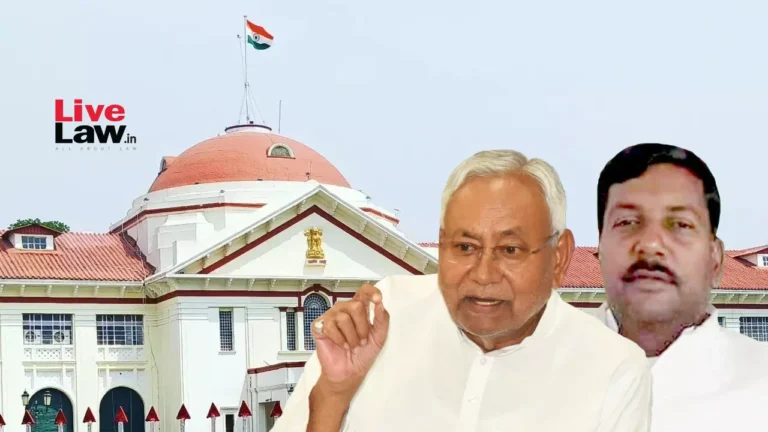The Patna High Court has dismissed a petition filed by Syed Abu Dojana challenging the election of JDU’s Dilip Ray to the Bihar Assembly.
The assembly elections for Sarsand constituency were held on November 7, 2020.
Syed Abu Dojana (election petitioner) contested the above election from the Representation of People’s Democratic Party (RJD) and emerged as the runner up. He has filed a petition under Sections 80, 80-A, 81 and 100 of the Representation of People’s Act, 1951 (RPA) challenging the election of Dilip Ray (defendant 1).
The petitioners alleged that Ray was disqualified for the following reasons: (i) concealment of information regarding his and his wife’s assets, (ii) failure to disclose his criminal history, and (iii) fraudulent counting of votes.
1 bench Justice Sunil Kumar Panwar Failure of a candidate to fully disclose information regarding assets and liabilities in an affidavit filed under Section 33A of the RPA is a ground for disqualification. “…Such repression must have a substantial impact on the election outcome.”
It said the burden of proof was on the petitioners to prove that Ray’s non-disclosure of assets had a significant impact on the election.
The court noted that the petitioner had described the properties belonging to Ray and his wife and argued that the details of the assets were not mentioned in the affidavit.After assessing the details, the court noted that the certain properties purchased by Ray’s wife had already been sold through a separate sale deed before he filed his nomination to contest the elections and certain properties owned by Ray were already mentioned in Form 26.
It was therefore held that Ray had not concealed details of any real estate belonging to him or his wife.
Failure to disclose criminal history
The petitioner alleged that Mr. Ray had not disclosed details of his criminal record electronically and further failed to do so on three different dates as per the Election Commission of India (ECI) regulations and directions of the Supreme Court.
The court noted that under Section 33A of the RPA, candidates have to disclose their criminal history and non-disclosure is a ground for disqualification.
The court said the onus was on Ray to prove that he had published his criminal record. The court considered the evidence submitted by Ray and noted that he had published details of his criminal record in Hindi newspapers on three occasions. He had also published it in electronic newspapers. The court noted that Ray had published it lawfully in accordance with the directions of the Supreme Court and the ECI.
The court therefore found that the evidence adduced by Ray showed that he had made a public announcement about his criminal history in accordance with the provisions of Section 33A of the Criminal History Publication Act.
Fraudulent vote counting
The petitioners alleged that postal votes were counted at locations away from the main counting center, that door-to-door ballot collection was improper, and that votes were rejected without justification.
The Court observed that the petitioners, in alleging manipulation of vote counts, had referred to revised instructions issued by the ECI, which provide for verification of rejected votes when the winning margin is less than the number of rejected votes. The Court noted that the instructions issued by the ECI were not applicable to the present case as the winning margin was more than 10 times the total number of votes counted through postal ballots.
“To set aside an election based on the vote count, the vote count must be deemed to have materially affected the election result. Whether the vote count materially affected the election result is a question of fact that must be determined on the basis of compelling evidence. The election petitioners have not presented such evidence.” The court stated.
The court said that procedural defects could not provide a basis for inferring that they had a significant effect on the election outcome unless they violated statutory provisions regarding vote counting.
“The law on disqualifying candidates provides that there must be a serious violation of legal provisions. Procedural regularities alone are not enough to declare an election invalid. However, if such irregularities lead to corruption, the election may be declared invalid.”
In this case, it was argued that there were procedural irregularities, but because there were no violations of laws regarding vote counting, the election could not be invalidated.
The High Court therefore held that there was no basis to disqualify Dilip Ray under the RPA.
Case Name: Syed Abu Dojana v. Dilip Ray and others (EP No.20 of 2020)
Citation: 2024 LiveLaw (Pat) 57
Click here to read/download the order

